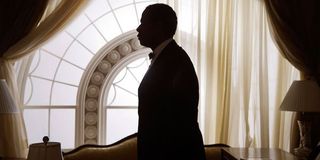Lee Daniels' The Butler Star Forest Whitaker On How The Black Panthers Influenced His Childhood

In theaters this Friday, Lee Daniels' The Butler covers a whole lot of history, from the plight of poor black sharecroppers working on plantations in the Deep South in the 1930s to the Civil Rights movement to the election of Barack Obama. But somehow, in the course of a 15 minute interview with the film's star, Forest Whitaker, we managed to cover even more history than that.
Whitaker plays Cecil Gaines, the character at the center of The Butler, based on a real man who worked in the White House for every President between Dwight D. Eisenhower and Ronald Reagan. Cecil is a father and husband who's happy to have a good job and unwilling to rock the boat politically, but his son (played by David Oyelowo) is the opposite, joining the Freedom Riders as a college student and eventually the Black Panthers. Telling the parallel story of Cecil and his son allows The Butler to touch on many elements of the Civil Rights era, but as Whitaker revealed, his own childhood in South Central Los Angeles put him directly in the middle of stories even more fascinating than those in the film.
Soft-spoken and speaking passionately, Whitaker at one point apologized for talking so much about history and social justice movements, but a conversation about something so big is remarkable in a world where most actors are happy to just promote their movie and move on. Check out my conversation with Whitaker below, and see him and an all-star cast in Lee Daniels' The Butler in theaters this weekend.
Since you’re born in 1961, you were kind of alive in the ‘60s, but you weren’t really old enough to participate in the stuff we see here. Did you ever get the romanticism of that era and feel like you’d missed out on the experience of like the Freedom Riders or the Freedom March or any of that stuff that was going on?
Yeah, but there’s a few things that I did kind of experience anyway, but in a different way. Because I grew up and I was raised in South Central LA, so the Black Panther Party’s office was around the corner from my house. So, every day I saw them as kids, they picked me up, they knew my name.
Were you one of the kids getting their free breakfast?
They asked me to, but my mom wouldn’t let me, you know.
CINEMABLEND NEWSLETTER
Your Daily Blend of Entertainment News
Did she think they were too radical?
I guess so. Yeah, and I guess she maybe was right because it was like later that when I walked by their office, it was blown up. They blew up the office, you know. Then later in life, when I was supposed to go to Compton High after Watts riots which was near my neighborhood but later I was supposed to go to Compton High, and my mom would bus me. I went over to my cousin’s house, across from Adams to be bussed to the beach, so it would at least take me two hours a day to get to school and two hours, a little longer on the way back after football practice. So, I would leave in the morning and wouldn’t come home until 10:00 at night.
And could you even process why that stuff was going on? Because when you’re younger, things just happen and you don’t really think about it.
No, I don’t think so. I knew the Panthers were cool. I remember looking at the poster of Huey. It was right there on the corner, and I remembered that they were really nice to me and I knew that they stood for strength and I remember what happened in school when the deaths happened, with King, and things like that. I remember the hush, know what I mean. The pain, but I don’t think I understood it, know what I mean? There’s a difference. The SLA...my grandma lived in this apartment and the SLA were killed in the apartment, this little building behind it, so as a little kid, a young kid, I would walk through the charred remains of that building and in a weird way, I was always kind of walking around these pieces of history.
Like it’s always been part of you, but only later could you put the pieces together.
Yeah, I don’t think I could have possibly understood it then, but then it did formulate some of my thinking later, you know, about what could happen, the potentiality of when you try to protest, what could happen from it, but also like about people fighting, you know, always aware. I don’t think I’d understand the principles of the party, because originally, like the Black Panther Party, a lot of organizations started off as neighborhood help organizations, like the Crip was a neighborhood, the gang was a neighborhood help organization. They started in Los Angeles, to help the community, you know what I mean, and then it grew into something else and turned into something else, basically because of pressure and disfunction of what society does when it doesn’t offer the economic opportunities as well as opportunities to be able to be treated as a human being.
Well so few films deal with the Panthers at all, and when they do, they’re often villainized. This one, obviously, in it, the son leaves them, but it shows the good work they were doing from the beginning, which is brave.
Yeah, it works a little bit on the borderline.
Yeah, the messages of what they really stood for.
Which I don’t think people really know, if they ever read the credos of it, they’d be really surprised. The idealists, not the ones who were unfortunately infiltrated, spied upon and tricked, but like the Fred Hamptons, in Chicago, and stuff like that. Those guys were trying so hard to help, know what I mean, in the means that they had. I think what’s great about the way Lee tells this story is that he lets you feel that in an emotional way. I mean, it continues to tell the story of our family, that way you get to see those historical moments and make them mean something to you in your body. That’s the only way you’ll understand something.

I feel like this summer has been really bizarre for race and people talking about race, because there’s been Trayvon Martin and there’s been the whole Paula Deen thing getting blown up, and the voting rights act striked down, and with Fruitvale Station and this
And also the march in Washington, this is the 50th anniversary of the I Have a Dream speech.
With this and you being involved in Fruitvale Station, it seems like you’re in the middle of this conversation. Has it been hard for you to kind of figure out where you are in that conversation? Has it been a tough summer for you in that way?
Not really, I mean I know that I believe we all are endowed with the right to be treated well and to have freedom. So, I was attracted to that. I met Ryan and Ryan had these ideas and this one appealed to me and I just said, let’s do it. I wanted to support him because I believe he is a voice of today and tomorrow, you know. I think he’s an important filmmaker and the story is important to be told, to start a dialogue and to make us think, you know fully, make us question, you know, and look for answers in ourselves. It doesn’t mean that we can always find the answer for yourself, but the pursuit of trying to do the right thing, you know, is important. And to not stand idly by, is important..
Well, what’s interesting about The Butler is in the way that Cecil is deliberately trying to not participate in everything that’s happening all around, really against his son being an activist. Then by the end, you see him kind of get into it by the end. I was trying to figure out if the movie thought he did the wrong thing by not participating in so much, the social activism of the ‘60s and it doesn’t seem like it really judges him, but I wonder if you felt that way.
I don’t think it does. I think there’s many different ways to shift perspective in reality, you know. There’s an attrition that occurs from someone just being in someone’s presence and new understanding.
Well, that’s what, like King says about the domestic workers and how it’s secretly subversive, I think he says.
It is subversive. I think that my character learns that for him, there are many different ways to protest, many different ways to move things forward. I think that he realizes that, cause he was protesting a lot when he walked in and asked for raises for the staff, he was protesting. When he tries to send his son, when he says, “I’m going to make you have another life you deserve, to have another life,” even though he wants him to stand out. He doesn’t want to go to fists, because he’s scared. He loves him, he doesn’t want to be hurt, but he does these things. Now, my son, he’s actively, aggressively trying to change the equation of caring, because both of us are about love, both of us are about caring, because I care so much about my family and want them to do better and to have a better life. My son cares so much about himself and his race that he wants, he’s forcing it to be a better life, you know what I mean. So, they’re different, coming from different perspectives, you know, just as like Martin and Malcolm came from different perspectives.
There’s this great triumphant moment at the end of the film where he’s going up to meet Barack Obama, but again, with all of the nasty stuff that’s been happening this summer in the news, it feels like there’s this sense of there’s so much left undone.
There is.
Do you feel that bittersweetness, when you get to the end of this movie?
I do. This movie is dealing with the civil rights movement, and everybody is looking at it like it’s history, but it’s not. This movie is dealing with the movement of reaching towards this goal of everybody being free and having all these rights that everybody has been talking about, to be equal. So, this is pushing it to here and it’s continuing the conversation. It’s a spring that’s moving. It’s a bike that’s moving down and it’s riding across and still hasn’t gotten to the other side of what this country supposedly, theoretically stands for, which may stand for that in ways more than any other country in the world, but it’s not gotten to the ideal that you and me want it to have.
So, this movie is just bringing us along the way. Now, should we be allowed to celebrate it at times? Should we be allowed to still have hope? We must have hope, you know what I mean. The whole campaign was built on hope. Every time we live and breathe, there’s hope, you know what I mean? Some people would say that even after we die, there’s still hope, but at least we know that while we’re breathing, there’s still hope that something can change and become better. [Note: I pointed out to Whitaker that the state motto of South Carolina is "While I breathe, I hope," which he says he didn't know before. He's just that quotable a guy.]
Staff Writer at CinemaBlend
Most Popular







